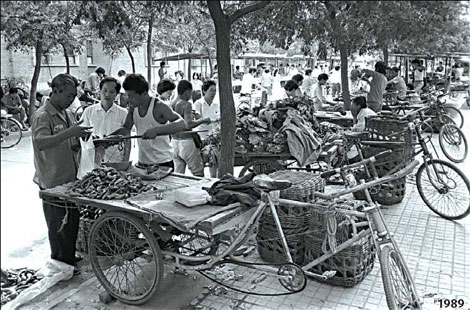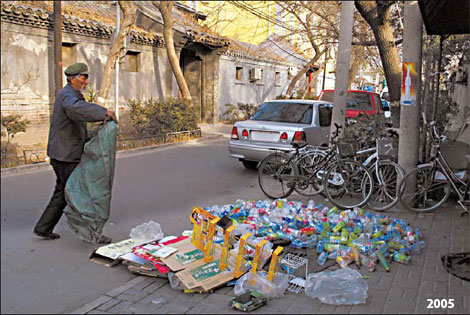
|
BIZCHINA> Wen's Lens
 |
|
Backward into the future
By YOU NUO (China Daily)
Updated: 2008-11-03 07:52

 Six hundred years ago Beijing was consisted of narrow streets called hutong. Those that exist today are under government protection in the inner city and must be at least more than 200 years old. Except for a few hutong under the government's special renovation program to attract tourists and shoppers, many of the old narrow streets have remained, the scenes of their daily lives evidence of the changes that the country has gone through. Buying groceries from mobile vendors who carried and hawked their goods on oversized tricycles cruising from one hutong to another used to be the morning activity of the hutong residents. Towards evening there would be another shopping session, with every vendor claiming his or her goods - from tender green onions to fruits - to be fresh from the suburban farms. In the early days of economic reform when the very phrase "market economy" was still a taboo, roadside markets were spontaneously formed by small and privately funded grocery vendors as you can see from our old photo this week. They were referred to awkwardly as a "commodity economy". What looked like a timid step, or half-step, in theory was a great leap forward in practice. As it turned out, the "commodity economy" in the 1980s was indeed China's starting point for the market economy. Nowadays, hutong has returned to their quiet pre-market normal life. Gone are the morning and evening markets and noise of vendors' hawking and boisterous bargaining between buyers and sellers. One can easily appreciate it by taking a stroll through a hutong in a weekday afternoon. Most people now get their groceries from the supermarkets and convenience stores where, of course, few items are truly fresh. Even the passing noise made by children going to and coming back from schools can in no way compare to the past, when people having fewer children and the urban population - not including the migrant workers - are aging. However, change continues. New ideas and new practices have come to stay and are reflected in the details of people's daily lives. The hutong neighborhoods are not only responsible for tidying and cleaning themselves, but are also engaged in many civil campaigns such as protecting the ancient architecture and trees. One of the changes, seemingly small but significant, has been recycling - the theme of our color photo this week. Organized collecting and recycling of household waste such as used paper, plastics and metals has been going on in hutongs, thanks in part to the close-knit neighborly relations. Some old hutongs are more advanced in the environmental movement than their suburban, middle class counterparts and perhaps also more careful than many industries.
 (China Daily 11/03/2008 page1) (For more biz stories, please visit Industries)
|
主站蜘蛛池模板: 国产精品毛片 | 日本一级特黄特色大片免费视频 | 欧美日韩高清不卡免费观看 | 国产精品18久久久久久vr | 欧美三级在线看 | 欧美大片在线播放 | 成年免费网站 | 久草视频在线免费 | 韩国一级片在线观看 | 国产成人网 | 国产成人精品日本亚洲专区6 | 你懂的国产精品 | 人成精品视频三区二区一区 | 91久久香蕉青青草原娱乐 | 色偷偷亚洲男人天堂 | 99久久综合国产精品免费 | 国产呦系列呦 | 草草影院国产第一页 | 91久久国产口精品久久久久 | 国产高清自拍视频 | 成人免费手机在线看网站 | a毛片在线观看 | 99精品在线免费 | 国产成人a大片大片在线播放 | 欧美日韩视频免费播放 | 亚洲天堂男人的天堂 | 亚洲视频在线观看地址 | 一色屋色费精品视频在线看 | 免费人成年短视频在线观看网站 | 久久在线免费视频 | 精品综合久久久久久88小说 | 永久网站色视频在线观看免费 | 成人亚洲国产 | 亚洲视频天堂 | 精品国产免费第一区二区三区日韩 | 国产精品三级在线观看 | 日韩三级一区 | 国产午夜亚洲精品第一区 | 国产日韩亚洲不卡高清在线观看 | 日本a级毛片免费观看 | 国产老头与老太hd |